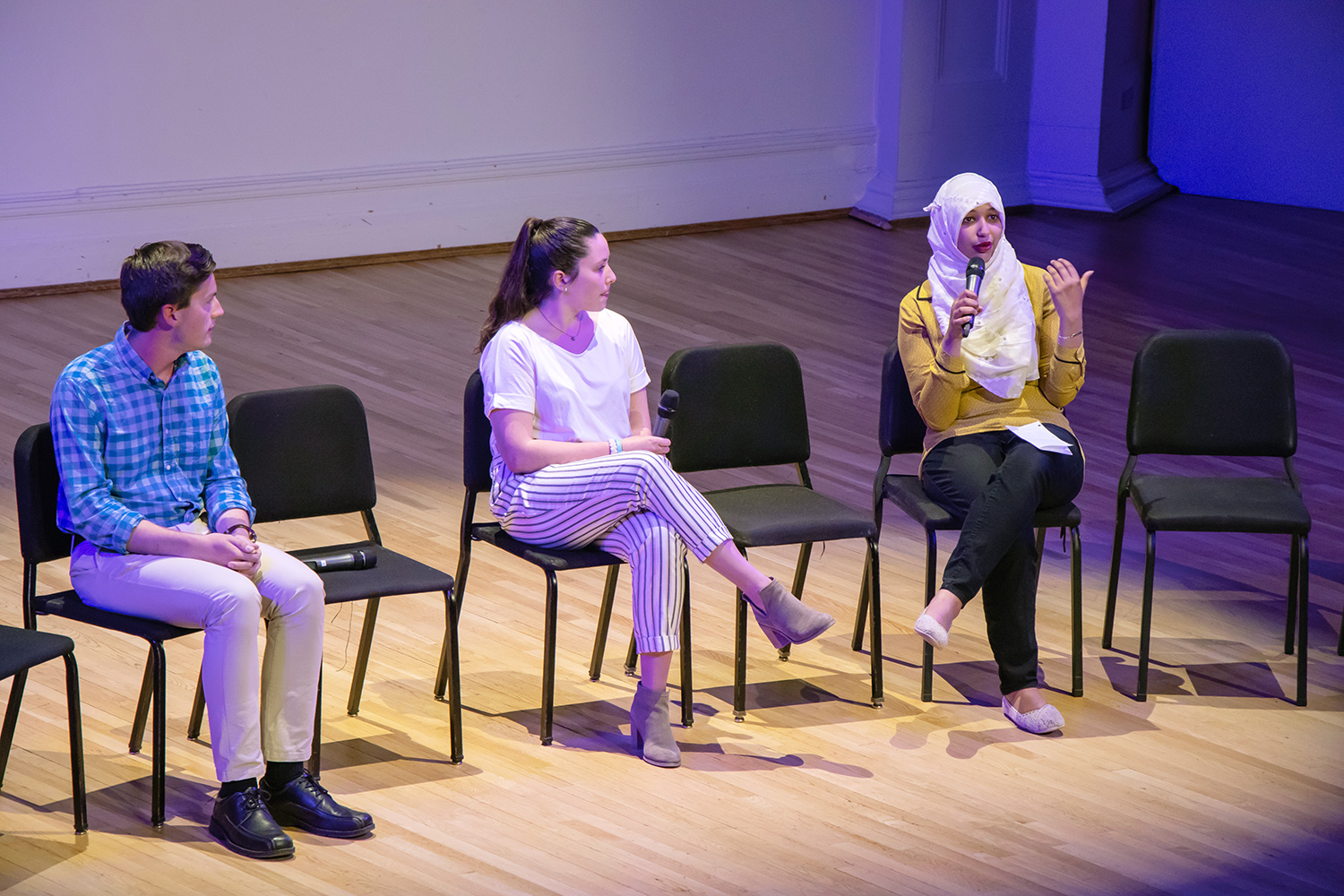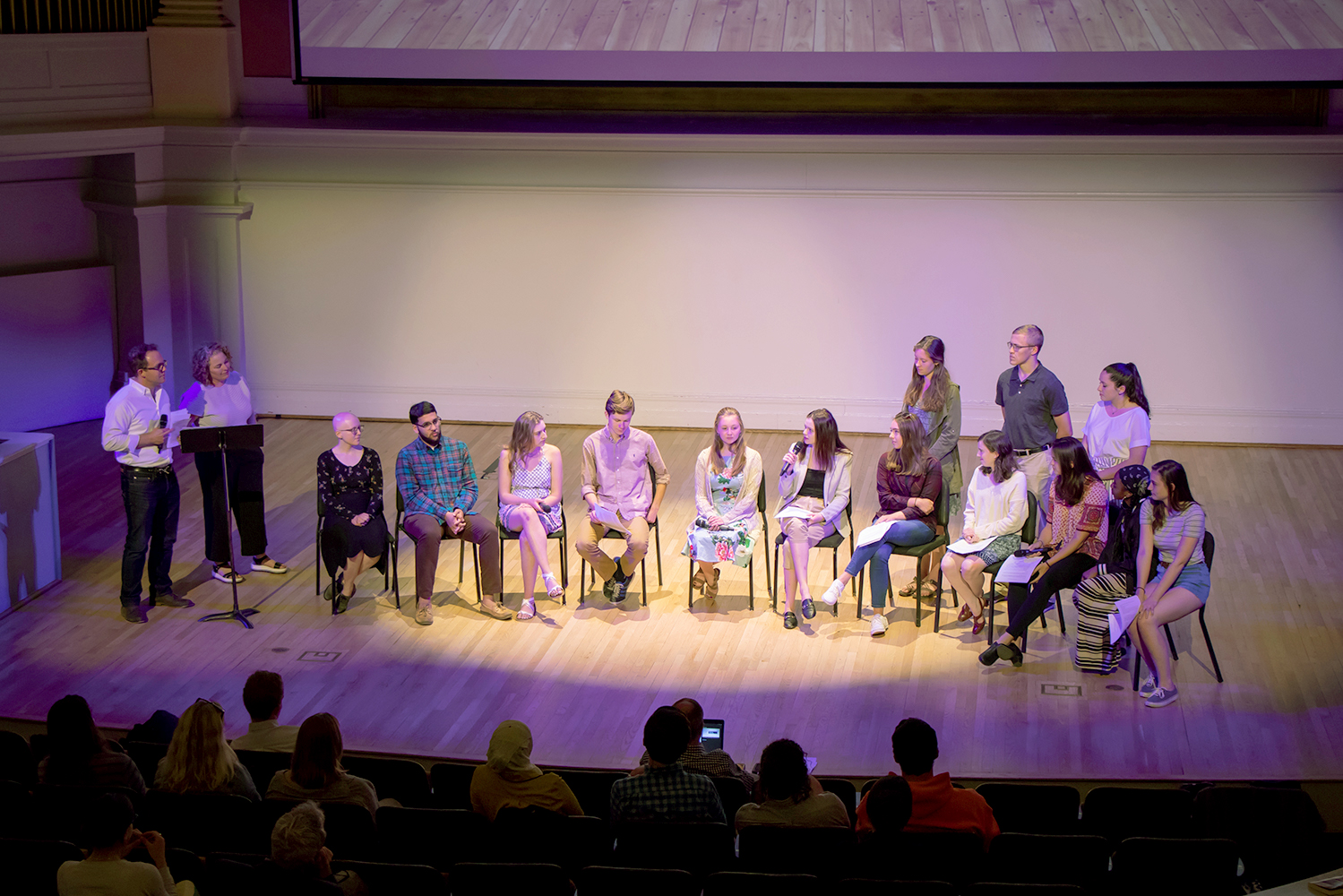Almost 200 years from the meeting at Rockfish Gap during which Thomas Jefferson and the other commissioners wrote the charter for the University of Virginia, a group of students reviewed the report to determine how it has stood the test of time.
About 600 first-year UVA students chose to enroll in a new Arts & Sciences curriculum, which included a common course on “Engaging Democracy at UVA.” Some of them met for a final convocation Monday evening to share several ideas that came from reading the University’s original charter, the Rockfish Gap Report.
The students, who met in small discussion groups all year, had two assignments: they annotated and commented on the document last semester, and this semester they worked together on a new charter, or “declaration,” for a 21st-century university.
Collectively annotating a document has a long academic tradition, from medieval manuscripts to Jewish commentaries, said English professor Bruce Holsinger in introducing Monday’s program in Old Cabell Hall. Holsinger, one of the faculty members participating in the new curriculum (who are called “College Fellows”), helped design the course and oversaw the work of the graduate teaching assistants who led the discussion groups.
Laura Goldblatt, a postdoctoral College Fellow, and several students talked about salient points of the report and how the commissioners incorporated the knowledge that the future would be different, so the institution would need to change with the times.
“They [the Board of Visitors] will be more advanced than we are, in science and in useful arts, and will know best what will suit the circumstances of their day,” the Rockfish Gap Report, written by Jefferson, says. This was important to the students from their vantage point today.
Christopher Johnson said he was glad that sentence was included. “I believe that this may be the most important sentiment of the document: the idea that the future will inevitably bring change. When creating something, especially a long-lasting institution, it is imperative that this is addressed, as rigid laws will become obsolete.”
Jefferson “brought the idea of changing institutions to better fit generations to his university, because he could not make it work in his country,” student Tessa Eggers said. “The commissioners put their faith in the future generations, hoping that the University will keep the same basic principles through a changing world.”
The concept of foresight seems to have fallen out of the norm with parts of society that are in power positions, student Patrick Croke said. “With the advent of newer technology and quicker forms of gratification, it seems as though there has been a rise in short-term goals, solutions and mindsets. Of course, these are broad generalizations. Nevertheless, I don’t hear or see much foresight in a lot of society today as refreshing as what we see in the works of our nation’s – and our University’s – founders.”
The group also talked about a few other things the report spells out in its objectives for higher education, obviously referring to white men as the citizens who need to be educated. That was one big change the students cited – that as a public university, the exclusions of women and minorities were challenged and the University has worked to become more diverse and offer the benefits of higher education to everyone.

First-year students, from left, Trevor Doiron, Martha Gallagher and Wafa Salah discuss what they learned from taking the new curriculum “Engagements” courses.
To Goldblatt’s question of whether going through their first year, the students felt they’d benefitted in learning to be more ethical citizens, they responded in the affirmative.
Student Chelsea Wells noted that gaining knowledge through education did help her learn more about being a moral person and how to be effective in working to solve problems.
Keenan Maher said he has learned to make more connections between history and the present day. “Democracy can devolve quickly, so it’s important to understand history,” he said.
The students made it clear they think self-governance is an important aspect of their education and think students should have more say in decision-making.
The co-directors of the College Fellows – Chad Welmon, a UVA associate professor of German studies, and associate professor of art history Sarah Betzer – chose two of the student-written new university charters and invited the student-authors to the stage to discuss their visions.
The group writing assignment came from another part of the “Engaging Democracy” course. Before working with the Rockfish Gap Report, all of the students read Danielle Allen’s “Our Declaration: A Reading of the Declaration of Independence in Defense of Equality,” which won the Francis Parkman Prize from the Society of American Historians. Allen gave a talk about it in February at one of the public events offered as part of the new curriculum.
One group wrote a new charter for UVA specifically and named five core values: honor, diversity, excellence, community and respect. These students would rename the governing board the Board of Residents to include students. They felt there should be more transparency in decision-making about the University.

The second group created a futuristic International Space Institute, imagining that a model society could be attempted on Mars to enable the human species to start anew because problems on Earth have become so intractable. This institute would deliberately bring together fractious groups who would have to create a new community. After seven years, they would return to Earth to share how they worked out their differences and worked together.
The final part of the convocation, “Looking Ahead,” featured students talking about how the Engagements courses challenged them and informed their choices for next year.
Wafa Salah said she had always thought of science and the humanities as distinct from each other, separated as they were in high school courses. Her experiences in the Engagements courses have shown her how the humanities can inform science.
“I see the world in a whole different perspective,” she said. “I want to learn the humanities to become a better scientist.”
Martha Gallagher said her courses had taught her to ask deeper questions and not just accept information without challenging it. Considering a career in politics, she identified what was most important for her: “I learned to listen to others and their perspectives and how to talk with others you don’t agree with.”
On behalf of all the students, Gallagher thanked the College Fellows for creating this environment for all the students to become so engaged with their education.
Media Contact
Article Information
May 2, 2018
/content/looking-backward-and-forward-first-year-students-celebrate-new-curriculum

